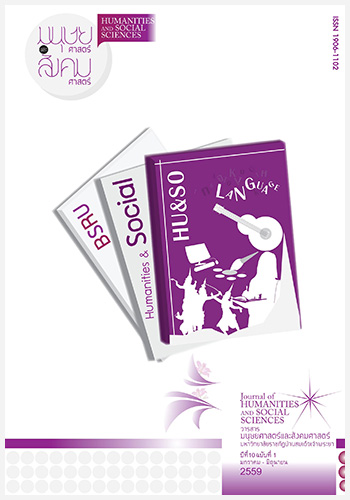การบริหารทรัพยากรมนุษย์เพื่อสนับสนุนการจัดการความรู้
คำสำคัญ:
การบริหารทรัพยากรมนุษย์, การจัดการความรู้บทคัดย่อ
การจัดการความรู้เป็นวิธีการจัดการและการใช้ความรู้ขององค์การเพื่อสร้างคุณค่าและทำให้เกิดประสิทธิภาพในการปฏิบัติงาน องค์การสามารถบรรลุเป้าหมาย ตามที่กาหนดไว้ อีกทั้งส่งผลให้เกิดการพัฒนาคน การพัฒนาองค์การไปสู่องค์การแห่งการเรียนรู้ปัจจัยสำคัญที่สุดที่ทำให้การจัดการความรู้ประสบผลสำเร็จคือ คนในองค์การ ซึ่งระบบการบริหารทรัพยากรมนุษย์ในองค์การที่มีประสิทธิภาพสามารถ ช่วยส่งเสริมสนับสนุนแนวคิดดังกล่าวได้เพราะมีบทบาทสำคัญในการที่จะทำให้ได้คนที่มีความรู้ ความสามารถและมีทักษะเหมาะสมตามสายวิชาชีพของแต่ละตำแหน่งเป็นผู้มีความพร้อมในการขับเคลื่อนองค์การ ซึ่งบทบาทของฝ่ายทรัพยากรมนุษย์ที่มีส่วนสำคัญที่สนับสนุนการจัดการความรู้ จะเริ่มตั้งแต่การออกแบบงาน การสรรหาและคัดเลือก บุคลากร การพัฒนาและฝึกอบรม การบริหารผลการปฏิบัติงาน การยกย่องชมเชยและการให้รางวัลและการธำรงรักษาบุคลากร
เอกสารอ้างอิง
นงนุช อุณอนันต์. (2558). การจัดการความรู้ (Knowledge Management). (พิมพ์ครั้งที่ 2). กรุงเทพฯ : โรงพิมพ์สหธรรมิก.
นงลักษณ์ แสงมหาชัย. (2552). อิทธิพลของระบบรางวัลต่อผลลัพธ์การจัดการ ทรัพยากรมนุษย์ : กรณีศึกษาบริษัทจดทะเบียนในตลาดหลักทรัพย์ แห่งประเทศไทย. วิทยานิพนธ์รัฐประศาสนศาสตรดุษฎีบัณฑิต สาขาวิชา รัฐประศาสนศาสตร์ สถาบันบัณฑิตพัฒนบริหารศาสตร์.
นิสดารก์ เวชยานนท์. (2554). มิติใหม่ในงานบริหารทรัพยากรมนุษย์. กรุงเทพฯ : คณะรัฐประศาสนศาสตร์ สถาบันบัณฑิตพัฒนบริหารศาสตร์.
ปิยนันท์ สวัสดิ์ศฤงฆาร. (2552). กลยุทธ์การจัดการความรู้. ค้นเมื่อวันที่ 22 พฤศจิกายน 2557). จาก http: //www.Oknation.net/blog/print.php?.id=530498
ภิราช รัตนันท์. (2555). การสร้างและตรวจสอบยืนยันตัวชี้วัดในพันธกิจการบริหาร ทรัพยากรมนุษย์ของอุตสาหกรรมการผลิตที่ใช้แรงงานเป็นหลักใน ประเทศไทย. วิทยานิพนธ์บริหารธุรกิจดุษฎีบัณฑิต สาขาวิชาบริหารธุรกิจ ดุษฎีบัณฑิต มหาวิทยาลัยธุรกิจบัณฑิตย์.
สุกัญญา รัศมีธรรมโชติ, วชิรพงษ์ สาลีสิงห์, สุธี พนาวร, ภูเบศร์ สมุทรจักร และสุรเชษฐ์ ผลวาณิช. (2550). การบริหารทรัพยากรมนุษย์ให้สุดยอด. Human Resource Management Cook Book. กรุงเทพฯ : สถาบันเพิ่มผลผลิต แห่งชาติ.
Aydin, B. & Ceylan, A. (2009). Department of Business Administration Gebze Institute of High Technoloty. University of Inonu Malatya Turkey.
Baird, K., H. Schoch, & Q. Chen, (2012). Performance management system effectiveness in Australian local government. Pacific Accounting Review. 24 (2), 161-185.
Chapman, K.L. Uggerslev, S.A. Carroll, K.A. Piasentin, D.A. Jones. (2005). Applicant attraction to organizations and job choice: A meta- analytic review of the correlates of recruiting outcomes. Journal of Applied Psychology. 90 (5), 928-944.
Choi, Y. S. (2000). Critical factor in the successful implementation of knowledge management. Journal of Knowledge Practice. 6 (2), 48-62.
Collins, C. J. & J. Han, (2004). Exploring applicant pool quantity : The effect of early recruitment practice strategies, corporate advertising, and firm reputation. Personnel Psychology. 57 (3), 685-717.
Curtis, S., & D. Wright, (2001). Retaining employees-the fast track to commitment. Management Research News. 24 (8), 59-64.
Claudio, F., G. Boris, & N. Nitin, (2009, May). The Definitive guide to recruiting in good times and bad. Harvard Business Review. 87 (5), 74-84.
Gueuta, H. G., & D. L. Stone, (2005). The Brave New World of eHR. San Francisco, CA : John Wiley.
Hewitt Associates. (2003). Best Employers in Asia Research : The Engagement Model. Retrieved 20 January 2010, From http: //www. asria.org/events/hongkong/june03/index_html/lib/BestEmployers In Asia2003.pdf.
Kucherov, D., & E. Zavyalova, (2012). HRD practices and talent management the companies with the employer brand. European Journal of Training and Development. 36, 86-104.
Nonaka, I. & T. Hirotaka, (2004). Hitotsubashi on knowledge management. Clementi Loop, Singapore : John Wiley (Asia).
Nonaka, I. & T. Hirotaka,. (1995). The Knowledge-creating company : How Japanese Companies Create the Dynamics of Innovation. New York : Oxford University.
Struckman, K. C. & J. F. Yammarino, (2003). Managing through multiple change activities: a solution to the enigma of the 21st Century. Organizational Dynamics. 32 (3), 234-246.
Taleo Research. (2009). Alignment Drives Employee Engagement and Productivity. Retrieved 29 May 2011. From http: //www.taleo.com
Tung, A., Baird, K. & H. P. Schoch, (2011). Factors influencing the effectiveness of performance measurement systems. International Journal of Operations & Production Management. 31(12), 1287-1310.
Ulrich, D. (1998). Delivering Results : a New Mandate for Human Resource Professionals. Boston : Harvard Business School Press.
Wood, L. M. (1996). Added value: marketing basics?. Journal of Marketing Management. (12), 735-755.
Wood, S. & Albanese, M. T. (1995). Can we speak of a high commitment management on the shop floor?.. Journal of Management Studies. 32, 215-247.
ดาวน์โหลด
เผยแพร่แล้ว
รูปแบบการอ้างอิง
ฉบับ
ประเภทบทความ
สัญญาอนุญาต

อนุญาตภายใต้เงื่อนไข Creative Commons Attribution-NonCommercial-NoDerivatives 4.0 International License.




